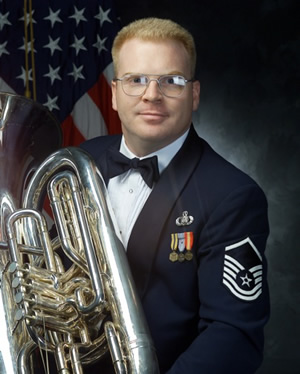The Triangle Brass Band drew first breath back in 1986, an amalgam of “school band directors, college faculty, physicians, lawyers, computer programmers and carpenters, to name a few.” In Meymandi Concert Hall on a cool, cloudy Sunday afternoon, they breathed new life into six major works for British band by way of their 25th Anniversary Concert. Music Director Tony Granados led the proceedings, with guest musician Chris Quade, possibly the finest tuba player anyone present had ever heard.
Granados pointed out that selecting festive Shostakovich pieces for such a celebration was a “no brainer.” So, opening the program was that composer’s “Festive Overture,” providing all sections with a vigorous workout, even furnishing a few “hummable” tunes, not common phenomena in his works. His Concertino, Op. 94, making like demands on the players, followed intermission.
Every tuba enthusiast around (along with those who could take it or leave it) should have been present to hear the true potential of that instrument. Chris Quade, associated with Ceremonial Brass and the USAF Concert Band, banished anyone’s “oom pah pah” idea of the tuba. Who knew that often overlooked huge brass could sound so melodious and mellow? The three-movement Tuba Concerto (1976) of English composer Edward Gregson was the main vehicle for Quade. Here the fast movements featured pleasing theme swaps between soloist and band. In the Lento, Quade managed the lows of the tuba with the smoothness of the highs. In the instrument’s high octave, one could sense the fluidity and charm usually associated with a French horn.
The soloist himself provided the arrangement of contemporary composer Kevin Norbury’s “Badinage.” Present here in this “playful raillery” was much of the silver tone to which the listener had become accustomed. (You could say that his tuba was at all times euphonious, but such claim must not be allowed to detract from the exceptional solo work turned in by band member Jesse Rackley on the euphonium.)
Seeing Leon Boellman’s Suite Gothique listed as a featured work for brass band tended to make one blink. Isn’t this a major pipe organ offering? Turns out that Eric Ball (1903-1989), English composer and brass specialist, has arranged it into as exciting a band work as you’re likely to encounter. None of the charm seemed to be lost in translation, notably present in the “Priere A Notre-Dame” movement. And for rousing excitement, the players’ rendition of the “Toccata” was practically without peer.
William Schuman’s (1910-1992) New England Triptych is considered an American orchestral classic. In 2005, Drew Fennell created a band arrangement of that work specifically for Granados. So including it was likely another “no brainer.” These “three pieces for orchestra” have maintained their Salvation Army character. The arranger has held that “the sonority of the brass band lends itself so well to projecting the intensity and passion of these hymntunes…” The players demonstrated the accuracy of that claim.
Seven current members have been with the Triangle Brass Band for all of its twenty-five years, many others for nearly as long. Such dedication is reflected in the excellence of their work. Now, strike up the band for the next twenty-five!











